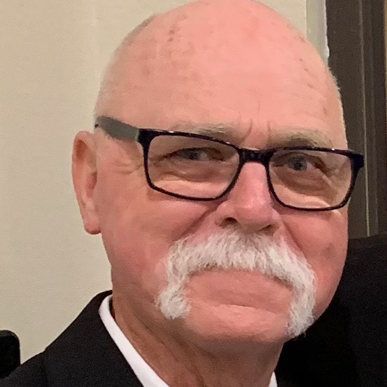“While working on our book I realized the detailed writing process was helping me fully process my cancer journey.”
When were you diagnosed with Hodgkin lymphoma?
It was 1987; I had developed a lump the size of a golf ball that protruded from the base at the right side of my neck. I was serving as a police officer with the City of Manhattan Beach, California, at the time. I blamed the accompanying fatigue on the long, extended shifts I was working. Doctor visits, labs and diagnostic procedures followed. This led to me being diagnosed with stage 3a Hodgkin lymphoma.
Cancer? My wife, Debbie, and I were shocked at the news. After 50 radiation sessions, the lymphoma went into remission. It took several months to heal from the laparotomy and gain sufficient energy before I was able to return to full duty at the police department.
Did your life return to normal?
Not really. Although grateful to be in remission, my life had been threatened, and I would never be the same. Debbie and I began thinking about moving; I had to get away from anything that reminded me of my cancer experience. We purchased a home set on four acres in San Diego County. Three months later, I began working as a police officer with a city close to our new home.
A year and a half later the Hodgkin’s returned. Debbie and I were, of course, devastated at the news the cancer was back. The oncologist who was caring for me prescribed chemotherapy. At the time I incorrectly believed chemotherapy was given to cancer patients to extend their lives by a few months, only to die from the disease anyway. I thought, this time I would die. I didn’t tolerate the chemotherapy very well. During the course of treatment, I was diagnosed with major depression.
Due to profound fatigue combined with the depression, I had to stop working. My fellow police officers and other city employees donated hours of paid leave for me so that I never missed a paycheck. Debbie and I remain grateful for their generosity.
Did the depression finally lift?
I was prescribed different antidepressants, but none were effective. Suicidal thoughts crept into my mind. Debbie found a local mental health center where I had a week of inpatient treatment. However, I was still depressed when discharged.
One or more psychiatrists, along with friends in the medical field, suggested electro-convulsive therapy (ECT). After ten treatments, the depression lifted. Several months later, I returned to serving as a police officer. At times I felt like a superman. I was healthy again; I felt alive.
What happened then?
Less than a year later, the fatigue that previously had signaled cancer returned. Concerned, I went back to my oncologist. Lab tests and a bone marrow biopsy showed I had chronic lymphocytic leukemia (CLL): cancer–again. That afternoon my wife and I sat on the couch, held each other and cried. But we weren’t alone. We were learning to share our burden with our new church family.
At the time, there was no treatment protocol for CLL—at least none that I found in my research. Thus, I chose to travel to Mexico to have a non-toxic chemotherapy based on natural ingredients. I failed to gain remission after two weeks of inpatient therapy and several months of outpatient treatment. Unable to work due to profound fatigue, I was forced to retire early from the police department. Five years after diagnosis, the CLL went into remission.
Did you experience any late effects from your original treatment for Hodgkin’s?
Yes. They include stenosis of the mitral valve and aortic valve, congestive heart failure and coronary artery disease. Also chronic kidney disease stage III, chronic fatigue syndrome, migraine headaches, high-frequency hearing loss, tinnitus, cognitive change, anemia and dysphagia (trouble swallowing).
In 2014, I had heart surgery to replace a severely diseased aortic valve. In 2021, my severely calcified mitral valve was replaced via the same procedure.
Between 2011 and today, my mental health diagnosis has included adjustment disorder with mixed anxiety and depression, major recurrent depression with anxiety, dysthmia (persistent mild depression) and mood disorder with depressive feature due to my general medical condition.
You wrote a book, Overcome: A Book of Intervention, Rescue and Redemption, along with your wife, Debbie.
Yes. While writing the book I came to realize doing so was helping me to fully process my cancer journey for the first time. Debbie wrote “Devoted,” which is my favorite chapter in the book! Together we’d hoped our story would be an encouragement to others.
Overcome is now in its third edition and available on Amazon. Debbie and I recently decided to donate some of the proceeds to Hodgkin’s International.
